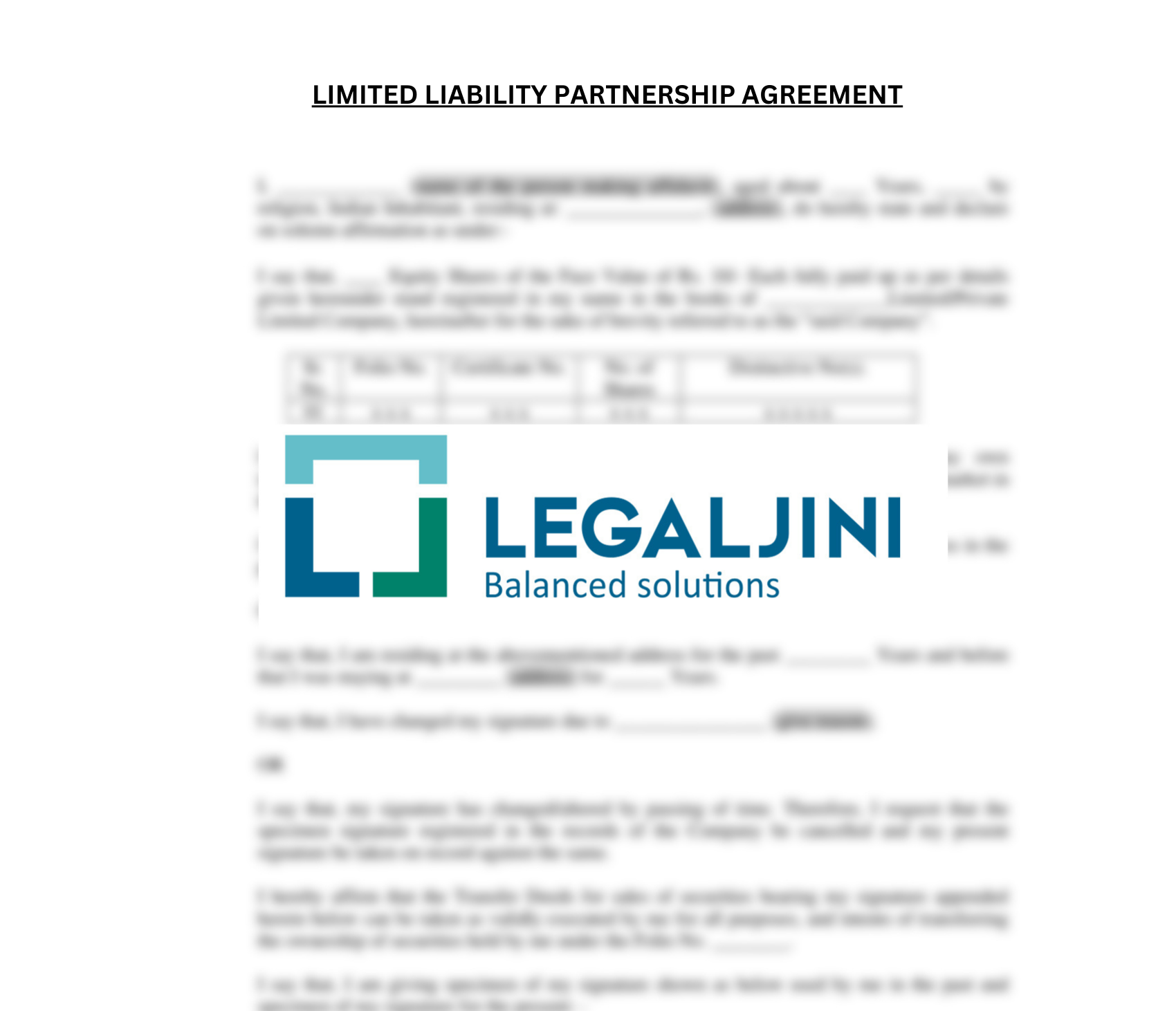Establish a legally sound and transparent partnership with our Limited Liability Partnership Agreement. This document outlines partnership terms, capital contributions, management structure, and provisions for termination or withdrawal, fostering a clear understanding among partners.
Limited Liability Partnership Agreement
Secure your business partnership with a comprehensive Limited Liability Partnership Agreement! At LegalJini we assist you with accurate partnership agreements to guard your business interests.
Everything On Partnership Agreement
What Is A Limited Liability Partnership In India?
A Limited Liability Partnership (LLP) in India is a hybrid business structure that combines the benefits of both a partnership and a company. LLPs offer the flexibility of a partnership while providing limited liability protection to the partners, meaning they are only liable for the amount they invest in the business. This makes LLPs an attractive option for businesses looking to reduce personal liability while maintaining operational flexibility.
What Is A Partnership Agreement?
A partnership agreement is a legally binding contract between two or more partners in a business. It outlines the terms and conditions of the partnership, including the roles and responsibilities of each partner, profit-sharing ratios, dispute-resolution mechanisms, and the procedure for adding or removing partners. General partnership guidelines, such as capital contributions, withdrawals, and financial reporting, are also outlined in the agreement.
Two or more general partners who established a firm for profit are involved in a general partnership. Every partner has equal responsibility for the company’s debts and obligations and the conduct of the other partner(s).
A partner doesn’t need to be an individual. They could also be a company or another type of business organization. A partner’s legal status must be disclosed as it may have tax ramifications.
The partnership agreement format should be tailored to meet the specific needs of the business and the partners involved.
Some other names for a partnership agreement are-
- Articles of Partnership
- General Partnership Agreement
- Partnership Contract
- Business Partnership Agreement
Who Needs A Partnership Agreement?
Any business operating as a partnership, whether it’s a general partnership, a limited partnership, or an LLP, needs a business partnership agreement.
Also, any two or more individuals, including friends, spouses, relatives, and coworkers, who operate a for-profit company together need to adhere to the business partnership agreement. Most notably this agreement is particularly crucial for LLPs.
What Is The Importance Of Partnership Agreement?
A partnership agreement is essential because it lays out each partner’s obligations and rights, this contract is valuable. It also gives the partners the option to alter how the law is applied to their partnership.
Some other reasons that highlight its importance are:
- Clarity and Transparency: It provides a clear understanding of each partner’s roles and responsibilities, reducing the risk of misunderstandings and conflicts.
- Dispute Resolution: The agreement includes mechanisms for resolving disputes, ensuring that disagreements don’t disrupt the business.
- Legal Protection: It offers legal protection by outlining the terms of the partnership, which can be enforced in court if necessary.
- Flexibility: The agreement can be customized to suit the specific needs of the partnership, including profit-sharing arrangements, decision-making processes, and procedures for adding or removing partners.
The Revised Uniform Partnership Act is the law that 37 states in the US abide by; nevertheless, certain of its requirements may not apply to your specific partnership or company. It is hence advised to take charge of the personal partnership agreement and tailor the relevant legislation to the company’s needs.
What Is Included In Partnership Agreement?
A well-drafted partnership agreement typically includes the following elements:
- Names of Partners: The legal names of all partners involved in the business.
- Capital Contributions: The amount of capital each partner will contribute to the business.
- Profit and Loss Sharing: The ratio in which profits and losses will be shared among the partners.
- Management Roles: The specific roles and responsibilities of each partner in the management of the business.
- Dispute Resolution: Procedures for resolving disputes between partners.
- Tax Elections: Decisions on the partnership process for tax purposes, including the election of tax status and methods for reporting income and losses.
- Admission and Withdrawal: Guidelines for adding new partners or withdrawing from the partnership.
- Dissolution: The process for dissolving the partnership (if necessary).
What Laws Are Applied To Partnership Agreements?
In India, partnership agreements are governed by various laws, depending on the type of partnership:
- Indian Partnership Act, 1932: This act applies to general partnerships and outlines the rights and duties of partners.
- Limited Liability Partnership Act, 2008: This act governs LLPs, providing a framework for the formation, management, and dissolution of LLPs.
- Indian Contract Act, 1872: This act governs the contractual obligations of the partners in a partnership agreement.
What Are The Limitations Of Partnership Agreement?
The partnership agreement is crucial for a structured and transparent business relationship, but there are certain limitations to consider:
- Unlimited Liability in General Partnerships: In a general partnership, partners have unlimited liability for the business’s debts. This means that their personal assets may be at risk if the business encounters financial difficulties.
- Shared Decision-Making: All partners typically have equal decision-making power, which can lead to conflicts, especially if there’s a disagreement on important business matters.
- Limited Lifespan: A partnership may dissolve if one partner leaves, retires, or passes away, which can create uncertainty for the business’s future.
- Complexity in Profit Sharing: Profit-sharing ratios can sometimes become complex and may lead to disputes if not clearly defined and agreed upon upfront.
- Tax Implications: Partnerships are pass-through entities, meaning the profits and losses are reported on the partners’ tax returns. This can complicate personal tax situations and may not always be the most tax-efficient structure.
- Difficulty in Raising Capital: Partnerships, especially smaller ones, might face challenges when it comes to raising large amounts of capital, as they typically rely on the contributions of the partners themselves.
Partnership Agreement Checklist
- Partner Identification
- Business Purpose
- Capital Contributions
- Profit and Loss Sharing
- Roles and Responsibilities
- Dispute Resolution
- Admission and Withdrawal Procedures
- Dissolution Guidelines
Partnership Agreement Template
A Partnership Agreement Template is a pre-drafted legal document designed to formalize the relationship between business partners. This template clearly defines the roles, responsibilities, and profit-sharing arrangements of each partner, ensuring a smooth and transparent business operation. By using a Partnership Agreement Template, you can avoid potential disputes and ensure that both parties are protected legally. Whether you are forming a new partnership or revising an existing one, a well-crafted Partnership Agreement provides clarity and safeguards the interests of everyone involved.
Get Started With LegalJini!
Ready to formalize your business partnership? At LegalJini, we offer expert legal services to help you create a comprehensive business partnership agreement that protects your interests and ensures smooth business operations. Whether you’re setting up a new partnership or formalizing an existing one, our team is here to assist you every step of the way.
FAQ!




